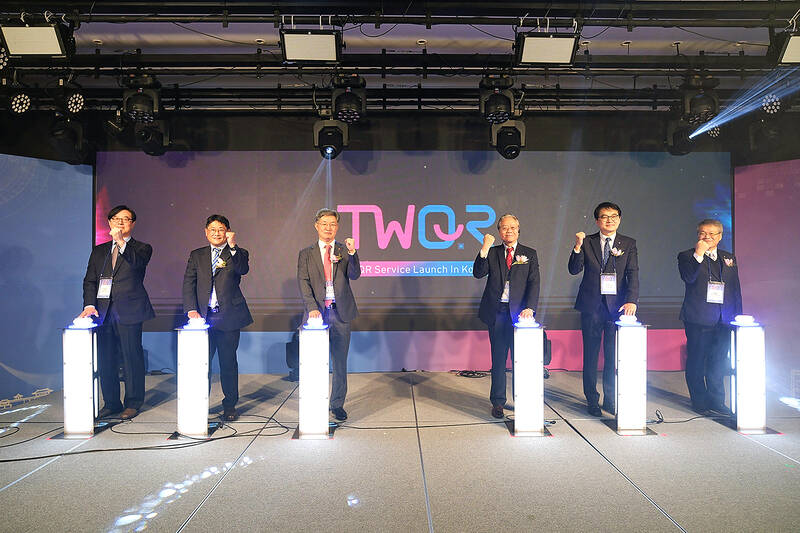The Taiwanese QR code mobile payment service, TWQR, has been launched in South Korea, the Bankers Association of the ROC (銀行公會) and Financial Information Service Co (FISC, 財金資訊) said in a joint statement yesterday.
The mobile payment service, available at 35,000 merchants in the East Asian country, is a collaboration between the two Taiwanese organizations and the South Korean financial services company BC Card Co, the statement said.
Thirteen Taiwanese financial institutions, led by the Bank of Taiwan (臺灣銀行), have partnered with BC Card for the new service, it said, adding that more banks and electronic payment service providers are expected to join the service.

Photo courtesy of Bankers Association of the ROC
Taiwanese with electronic wallets linked to any of the 13 financial institutions can pay for purchases or expenses in South Korea by scanning the merchants’ TWQR code without having to download separate apps, the statement said.
The new service would save users 1.5 percent on credit card processing fees, and reward them with 15 percent cash back until the end of April, it said.
Two-way travel between Taiwan and South Korea reached up to 2.5 million visits each year before the COVID-19 pandemic.
With mutual visits recovering quickly after the pandemic, South Korea was the third-most popular destination for Taiwanese travelers last year, the Bankers Association and FISC said, citing statistics provided by the Tourism Administration.
Yesterday’s announcement was made at a news conference in Seoul, with Bankers Association chairman Lei Chung-dar (雷仲達), FISC chairman Lin Kuo-liang (林國良) and BC Card CEO Choi Won-seok, as well as several business and industry representatives from the two countries attending.
“Taiwan and South Korea are geographically close to each other and are each other’s fifth-largest trading partner,” Lei said in the statement. “At a time when bilateral exchanges between Taiwan and South Korea are increasing, the launch of the TWQR mobile payment service in South Korea is expected to benefit more Taiwanese visiting South Korea and further promote cashless transactions.”
Following the introduction of TWQR in South Korea, the next step is to allow South Korean tourists to make simple and convenient payments in Taiwan, Lin said in the statement.
Longer term, FISC aims to work with more countries on cross-border payment cooperation and promote more financial exchanges, he added.

In Italy’s storied gold-making hubs, jewelers are reworking their designs to trim gold content as they race to blunt the effect of record prices and appeal to shoppers watching their budgets. Gold prices hit a record high on Thursday, surging near US$5,600 an ounce, more than double a year ago as geopolitical concerns and jitters over trade pushed investors toward the safe-haven asset. The rally is putting undue pressure on small artisans as they face mounting demands from customers, including international brands, to produce cheaper items, from signature pieces to wedding rings, according to interviews with four independent jewelers in Italy’s main

Japanese Prime Minister Sanae Takaichi has talked up the benefits of a weaker yen in a campaign speech, adopting a tone at odds with her finance ministry, which has refused to rule out any options to counter excessive foreign exchange volatility. Takaichi later softened her stance, saying she did not have a preference for the yen’s direction. “People say the weak yen is bad right now, but for export industries, it’s a major opportunity,” Takaichi said on Saturday at a rally for Liberal Democratic Party candidate Daishiro Yamagiwa in Kanagawa Prefecture ahead of a snap election on Sunday. “Whether it’s selling food or

CONCERNS: Tech companies investing in AI businesses that purchase their products have raised questions among investors that they are artificially propping up demand Nvidia Corp chief executive officer Jensen Huang (黃仁勳) on Saturday said that the company would be participating in OpenAI’s latest funding round, describing it as potentially “the largest investment we’ve ever made.” “We will invest a great deal of money,” Huang told reporters while visiting Taipei. “I believe in OpenAI. The work that they do is incredible. They’re one of the most consequential companies of our time.” Huang did not say exactly how much Nvidia might contribute, but described the investment as “huge.” “Let Sam announce how much he’s going to raise — it’s for him to decide,” Huang said, referring to OpenAI

The global server market is expected to grow 12.8 percent annually this year, with artificial intelligence (AI) servers projected to account for 16.5 percent, driven by continued investment in AI infrastructure by major cloud service providers (CSPs), market researcher TrendForce Corp (集邦科技) said yesterday. Global AI server shipments this year are expected to increase 28 percent year-on-year to more than 2.7 million units, driven by sustained demand from CSPs and government sovereign cloud projects, TrendForce analyst Frank Kung (龔明德) told the Taipei Times. Demand for GPU-based AI servers, including Nvidia Corp’s GB and Vera Rubin rack systems, is expected to remain high,